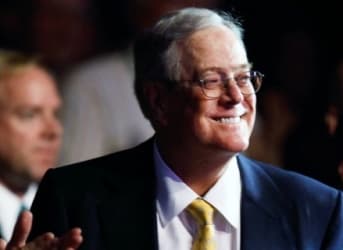1. Charles and David Koch ($68 billion jointly)
The bogeymen of the Democratic Party inherited their fortunes, along with the family business, from their father, Fred. But they’ve since shown a keen entrepreneurial spirit. Koch Industries’ claim to fame initially was a proprietary oil refining technique, but the brothers soon diversified the product portfolio to encompass refineries, pipelines, and the manufacturing of chemicals, polymers and fibers. This wide swathe of business interests is still focused on oil, but Koch Industries has now become America’s second largest private company, behind Cargill. Its main oil and gas subsidiary, Flint Hills Resources, processes well over 300 million barrels of oil a year. That figure is one reason the Kochs are vilified by environmentalists: Combined, their companies emit more than 300 million tons of greenhouse gasses a year, the equivalent of over 5 percent of the U.S. carbon footprint. But the reputations of Charles and David Koch are less based on their business success than on their staunch support of the Republican Party. The Koch’s political action committee is consistently the largest oil- and gas-money contributor to the Republican Party.
2. Mukesh Ambani ($21.5 billion)
Barons who obtained their fortunes from dearest dad occupy the top two spots on the list. Mukesh Ambani currently oversees India’s Reliance Industries. Having begun as a textiles maker, Reliance Industries created a dedicated subsidiary, Reliance Industries, which has had a spectacular run since it burst onto the world scene in 2008. It owns the world’s biggest refinery at Jamnagar in Gujarat, with a capacity of 1.24 million barrels per day. The mother ship of Reliance Industries is also the world’s foremost polyester producer, but it has taken steps to mitigate its environmental impact by opening the largest polyester-recycling center in existence. The power of running India’s second largest company has given Ambani a major pulpit from which to pursue his business and philanthropic ideals. However, his rise may not have been to everyone’s liking: one of the first actions of Narendra Modi’s new government was to hit Reliance with a $579 million fine, only the latest in a series of penalties stemming from the corporation’s failure to meet legally binding gas production commitments from the gas fields it operates in India.
3. Viktor Vekselberg ($17.2 billion)
Russian mogul Viktor Vekselberg’s list of friends is enviable, as it includes Russian President Vladimir Putin and Mikhail Fridman, his predecessor on this very list. Vekselberg also directly benefited from the rise and eventual sale of TNK-BP, having once been its deputy director as well as acting as chairman of TNK. His early wealth came from aluminum after he capitalized on the opportunities brought about by perestroika and glasnost to emerge as one of Russia’s first successful private entrepreneurs. He co-founded the Siberian-Urals Aluminum Company and took a nice profit when this company was absorbed by RUSAL, the largest company in the sector. His interest then turned to oil and gas when his holding company, Renova Group, founded TNK-BP with Alfa Group, in a merger with BP’s oil assets in the country. He has long had a keen interest in IT and telecoms, having been appointed by Putin in 2010 as the director of Skolkovo, a project seeking to build a Russian rival of Silicon Valley. Interestingly, Vekselberg’s oil profits have been poured into the world’s largest collection of Fabergé eggs: he owns 15 at an estimated cost of $100 million.
Related Article: Oil Giants Gassed Out On Renewable Energy
4. Mikhail Fridman ($16.5 billion)
A wise man once said that the friendships you make in college last for life. While there’s no record of how close Mikhail Fridman was in college with classmates German Khan and Alexei Kuzmichev, the three together run Russia’s Alfa Group conglomerate. In 2013, Alfa Group’s revenue came in at $16.8 billion. Today, Fridman’s interests are now mostly in industries such as banking and insurance, but most of his personal wealth can be traced back to last year when Alfa Group sold a 90 percent stake in TNK-BP to Rosneft. At the time, TNK-BP was Russia’s third-largest producer and the deal netted the three college buddies a combined $14 billion.
5. Vagit Alekperov ($14.8 billion)
Vagit Alekperov stands alone among the world’s five richest oil and gas barons as the only one who worked his way up in the trade. The current CEO of LUKoil, Russia’s second largest oil company, rose from the bottom: Emerging from Azerbaijan during the Soviet era, he worked as a drilling operator, then an engineer and on up until he became deputy director general of Bashneft and deputy minister for oil and gas for the Soviet Union. His fortune has skyrocketed since the fall of the Soviet Union. As head of LUKoil, Alekperov owns 20 percent of the company, which accounts for his billions. He has also engineered the company’s international expansion to over 40 countries, its listing on the New York Stock Exchange, and has used his links to Putin to secure LUKoil’s future as a pillar of support of the Russian economy. And just so the Alekperov name continues to be associated with the company, he has instructed his son Yusuf to hold on to his shares in LUKoil and is grooming him to take over as CEO.
By Chris Dalby for Oilprice.com


















